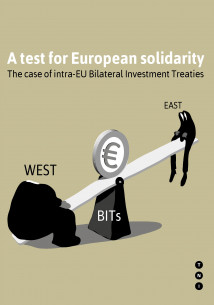INDEX
1 A vast web of intra-EU BITs
2 Central and Eastern European Countries: the target of lawsuits based on intra-EU BITs
3 Compliance with EU law as the source of the lawsuits
4 The intra-EU BITs debate
a) Position of the European Commission
b) Position of Western European Member States, with a focus on the Dutch government
c) Position of Central and Eastern European Member States, with a focus on Czech Republic
d) Position of investment lawyers, including investment arbitrators
5 Imminent next wave of disputes in the solar energy sector
6 The rhetoric of solidarity within the European Union
ANNEX - List of known investment treaty cases against European Member States
Summary
During the 1990s, most European Union (EU) Member States (Western European countries) signed Bilateral Investment Treaties (BITs) with many Central and Eastern European and Mediterranean governments. At that time they were simply BITs between EU Member States and third countries. But, with the accession to the EU of 12 new countries (majority from Central and Eastern Europe) in 2004 and 2007, suddenly, a vast web of BITs between EU Member States (“Intra-EU BITs”) emerged. Currently, there are an estimated 190 intra-EU BITs.
Central and Eastern European countries have regularly been at the receiving end of lawsuits from investors. Together they have been sued, at least, 77 times. This number is particularly striking if we compare it with the known cases of corporate investors suing Western European states, against whom there are only 7 recorded cases.
But an even more remarkable characteristic emerges when we ask the question: who is suing the Central and Eastern European countries? The answer is, mainly companies from fellow European countries. In fact 65% of all disputes against Central and Eastern Europe are based on intra-EU BITs.
The existence of this new category of BITs, has opened up a wide debate that involves the European Commission (EC), the “old” Member States (EU-15) and the “new” Member States (EU-12). At the core of the discussion is the validity of these agreements. Members of the international Investment community, including arbitrators and corporate investors, have also made their positions heard.
The European Commission, together with Eastern and Central European Member States, has questioned the validity of these BITs. Meanwhile, western European Member States have, so far, fervently opposed the argument that BITs signed with other EU Member States before accession are now invalid. Their position signals that defending big business is still the main priority for the “old” EU Member States, rather than building solidarity.
Solidarity among fellow European countries has been presented as a core value underlying the European Union’s political and economic integration process. The notion of European solidarity is already being tested during the Eurozone debt crisis. If countries like Germany, the Netherlands and UK do not change their position and start terminating the extensive web of intra-EU BITs, European solidarity will sound increasingly like empty rhetoric.



